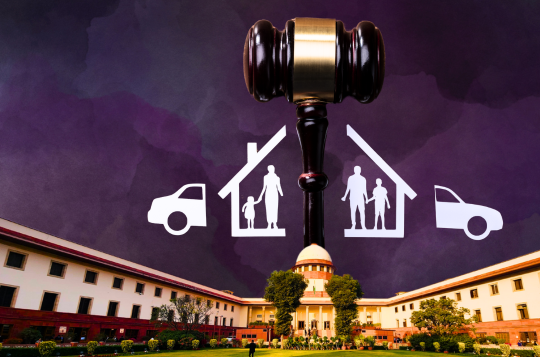Recently, the Supreme Court, while adjudicating a matter involving charges under Sections 498A, 323, 504, 506 and 34 IPC, considered the justifiability of continuing criminal proceedings.
Supreme Court, upon reviewing the matter in detail, observed that the essential legal ingredients necessary to substantiate the charges, particularly under Section 498A related to cruelty, were absent.
SC Bench further noted that the complaint lacked specific instances of cruelty, assault, or criminal intimidation as required under the law. The Court emphasized that mere family discord or strained relations do not meet the legal threshold for such serious criminal charges.
Brief Fact :
The criminal appeal arises from the dismissal of a petition filed under Section 482 of the CrPC, seeking to quash an FIR and subsequent chargesheet against the appellants. On May 1, 2018, this Court stayed the criminal proceedings while issuing notice on a Special Leave Petition.
The complainant, married to Niraj Mahendrabhai Patel in 2002, filed a complaint on March 1, 2013, leading to the registration of an FIR on March 25, 2013, under Sections 498A, 323, 504, 506 read with Section 34 of the IPC against her stepmother-in-law, stepbrother-in-law, father-in-law, and the family accountant. The allegations include dowry harassment, physical assault, and threats regarding property rights. The appellants petitioned to quash the FIR and chargesheet, but the High Court found a prima facie case of cruelty under Section 498A and held that the jurisdiction for the case lay in Jalna, Maharashtra. The appellants have since appealed the High Court’s decision.
Contention of Petitioner:
The counsel for the appellant argues that the allegations in the FIR are vague and general, lacking essential details and material particulars, which renders the complaint obscure. They assert that the FIR is an abuse of the criminal process, stemming from an existing civil dispute between the father and son. Additionally, they highlight that the statements of witnesses recorded under Section 161 are identical and solely based on information from the respondent, lacking specificity regarding the date and time of the alleged incidents. The appellants also reference a previous judgement from the respondent, lacking specificity regarding the date and of the alleged incidents. Further, the counsel referred to a previous judgment from the Judicial Magistrate First Class, Jalna, which dismissed similar allegations under Section 12 of the Domestic Violence Act.
Contention of Respondent:
The Counsel for the respondent supports the High Court’s decision and reasoning.
Observation of the Commission:
The Court while examining the allegations in the Complaint, concluded that there were specific accusations against each accused, deeming the exercise of power under Section 482 CrPC unwarranted. However, the court did not provide a detailed analysis, particularly regarding the duty of the court to assess the allegations in cases involving ulterior motives.
The Apex Court enunciated that “After referring to certain precedents on the scope and ambit of the power under Section 482 CrPC, the High Court came to a conclusion that exercise of power under Section 482 for quashing an FIR/Complaint is not warranted in the facts and circumstances of the case. Beyond holding that there are specific allegations, there is no other analysis. The duty of the High Court, when its jurisdiction under Section 482 CrPC or Article 226 of the Constitution is invoked on the ground that the Complaint/FIR is manifestly frivolous, vexatious or instituted with ulterior motive for wreaking vengeance, to examine the allegations with care and caution”. Additionally, in Mohammad Wajid v. State of U.P., the Supreme Court emphasized the need for scrutiny of such complaints, noting that allegations driven by personal vengeance might be well-drafted but lack substance.
SC Bench stated that the FIR appears to stem from a property dispute between the complainant’s husband and his father, where the complainant filed criminal charges alleging dowry demands and threats. Interestingly, the husband pursued a civil suit over the property, while the complainant initiated criminal proceedings with no mention of the civil dispute in her complaint. The court observed that the primary theme of the FIR resolved around the threat of denying a share in the property, indicating that the criminal complaint served to further the complainant’s civil interest.
Further, the Supreme Court noted that the allegations were vague and lacked specifics, a common occurrence in matrimonial disputes. For instance, claims regarding dowry and property were not substantiated with necessary details. The court referenced earlier judgments where similar vague and omnibus allegations were dismissed, emphasizing that criminal complaints should not be used to advance civil claims.
The decision of the Commission:
The court decided that none of the ingredients of Sections 498A, 323, 504, 506 and 34 IPC were made out. It quashed the FIR dated 25.03.2013 filed under these sections at P.S. Jalna, along with the chargesheet dated 30.07.2013. The court set aside the High Court’s impugned judgment in Criminal Application No. 4015 of 2014, declaring that allowing the criminal proceedings to continue would amount to an abuse of process and a travesty of justice.
Title: KAILASHBEN MAHENDRABHAI PATEL & ORS. vs. STATE OF MAHARASHTRA & ANR.
Citation: SLP (CRL) No. 4044 of 2018
LatestLaws.com Citation: 2024 Latest Caselaw 609 SC
Coram: Justice Pamidighantam Sri Narasimha, Justice Pankaj Mithal
Advocate for Petitioner: Adv. Abhishek Manu Singhvi (Sr. Advocate), Siddharth Luthra (Sr. Advocate)
Advocate for Respondent: Adv. Shrirang B Varma, Sanjeev Despande (Sr. Advocate)


